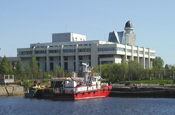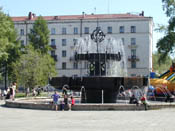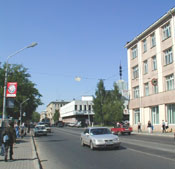Arkhangelsk
 Arkhangelsk was founded in 1584 by the decree of Ivan the Terrible.
Since the beginning of XVII century and hitherto the city has been one of the largest seaports in the north of Russia.
Arkhangelsk was founded in 1584 by the decree of Ivan the Terrible.
Since the beginning of XVII century and hitherto the city has been one of the largest seaports in the north of Russia.
Arkhangelsk is the administrative centre of Arkhangelskaya oblast. It is situated in the mouth of the river Northern Dvina at its flowing into the White Sea. The territory of municipal formation "The city of Arkhangelsk" makes 29442 hectares. The city quays run along river branches for 35 kms.
 The climate is subarctic and maritime with long winters and short cool summers. Average temperature of January is -13, of July +17 degrees centigrade. Precipitations for a year are 529 mm.
The climate is subarctic and maritime with long winters and short cool summers. Average temperature of January is -13, of July +17 degrees centigrade. Precipitations for a year are 529 mm.
The population of city in January 01, 2001 was 364700 people.
Arkhangelsk is the large scientific and industrial centre of northwest of Russia. It is the area rich of natural resources: wood, fish; deposits of diamonds, petroleum, bauxites. Here enterprises of wood-working, timber-chemical, pulp-and-paper, fish, microbiological and machine-building industries are concentrated. In the city there registered 7700 enterprises, 2200 of them are large and middle-scale. The leading part in the industry belongs to wood branch. The timber industry enterprises produce over 40 % of total city's quantum of output. Wood, paper, cardboard, cellulose and fish even today remain the main products Arkhangelsk trade in with other regions of Russia and the West countries.
 Today in Arkhangelsk functions 200 educational institutions and 18 municipal medical establishments.
Today in Arkhangelsk functions 200 educational institutions and 18 municipal medical establishments.
Arkhangelsk is not only the industrial centre of oblast, but the cultural and historical capital of "Pomoriye" as well, which is the native land of northern culture, traditions and history. In the city there are the Pomoriye State University, the Forestry Engineering and Medical Institutes, the branch of the State Sea Academy, the faculty of the All-Russian Correspondence Financial and Economic Institute.
Theatres: the Drama Theatre named after Ì.Â. Lomonosov, the Youth Theatre, the Puppet Theatre.The circus and philarmonic society. The Academic Northern Russian National Chorus, the National Ensemble of Song and Dance "Siverko". There is the Museum of local lore (founded in 1859, it exhibits rich natural-science and archeologic collections; documents of architectural "biography" of the city (ancient plans, maps, views, photos and pictures of now-vanished monuments), the history of development of the North and discovery of Arctic regions; national woodcarving, Kholmogory carved bone, black-letter and hand-written books). The Fine Arts Museum (founded in 1960; there are collections of northern Russian icons of 16-18 centuries, old russian polychromic sculpture, folk art (embroidery, northern wooden, fur and clay toys), Russian painting, graphics, sculpture).
CITIES OF RUSSIA
Abakan I
Aginskoye I
Anadyr I
Arkhangelsk I
Astrakhan I
Barnaul I
Belgorod I
Birobidzhan I
Blagoveshensk I
Bryansk I
Cheboksary I
Chelyabinsk I
Cherkessk I
Chita I
Ekaterinburg I
Elista I
Gorno-Altaisk I
Groznyi I
Ioshkar-Ola I
Irkutsk I
Ivanovo I
Izhevsk I
Kaliningrad I
Kaluga I
Kazan I
Kemerovo I
Khabarovsk I
Khanty-Mansiysk I
Kirov I
Kostroma I
Krasnodar I
Krasnoyarsk I
Kudymkar I
Kurgan I
Kursk I
Kyzyl I
Lipetsk I
Magadan I
Maikop I
Makhachkala I
Moscow I
Murmansk I
Nalchik I
Naryan-Mar I
Nizhny Novgorod I
Norilsk I
Novgorod the Great I
Novosibirsk I
Omsk I
Orenburg I
Oryol I
Penza I
Perm I
Petropavlovsk-Kamchatsky I
Petrozavodsk I
Pskov I
Rostov the Great I
Ryazan I
Saint-Petersburg I
Salekhard I
Samara I
Saransk I
Saratov I
Smolensk I
Stavropol I
Syktyvkar I
Tambov I
Tomsk I
Tula I
Tver I
Tyumen I
Ufa I
Ulan-Ude I
Ulyanovsk I
Vladikavkaz I
Vladimir I
Vladivostok I
Volgograd I
Vologda I
Voronezh I
Yakutsk I
Yaroslavl I
Yuzhno-Sakhalinsk I
|